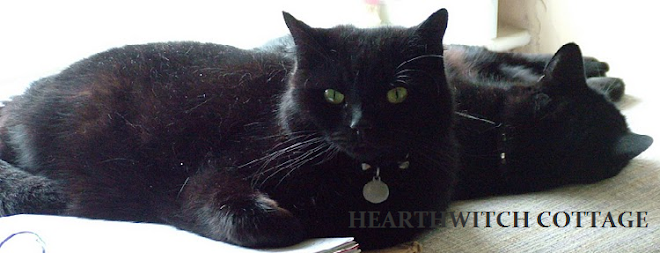The village wise-woman of yesteryear would not have had access to online pagan shops, sending her sage bundles and juniper berries via express delivery; nor would folk have a Waitrose or Sainsbury's round the corner to buy pre-packaged bananas which have been flown thousands of miles and had their ripening process artificially sped up with chemicals.
Granted, these are extreme examples, but the principle behind them is simple: today we literally have our food put on our plates. Comparatively few people 'hunt' or 'gather' any more. While many still tend a garden to grow some herbs, vegetables and fruit and some may rear animals for their produce, this is a decreasing number in the UK. I would put money on fewer still going out into the countryside and 'foraging' for their food.
At this time of year the hedgerows are springing back to life. We see nettles, dandelions and yarrow sprouting up; in a month or so the wild garlic will be out; come summer there will be elderflower to collect and by autumn the rosehips, blackberries and sloes will be ready for harvesting. According to researchers at Emory University, Atlanta, our ancestors ate 200 more plant species than us, gaining five times more micro-nutrients and three times more vitamins as a result.
Today I will focus on the humble nettle, more well known for its infamous sting than its culinary and medicinal properties. In the UK the nettle is ubiquitous, making it a perfect food for wild foraging. You can find them in fields, hedgerows, along pathways and - with all probability - in your own back garden.
At this time of year, the leaves are tender and fresh, so you can pick the whole stem. You should avoid larger leaves as the plants get bigger, instead choosing only the shoots, and don't pick them once the plant has flowered. Remember to take care whilst picking them as they can give a nasty sting. I recommend wearing tough gloves - the kind of thing you would usually adorn for gardening.
Once you have gathered enough, there is a variety of culinary uses for these mineral-rich leaves: soups, teas and juices are the most well-known, although our favourite seasonal chef - Hugh Fearnley-Wurnley - has a slightly more ambitious recipe for nettle tagliatelle if you fancy having a go! I'll be posting up a recipe for nettle soup tomorrow.
Nettles are rich in vitamins and minerals: they are an important source of beta-carotene, vitamins A, C and E as well as iron, calcium and phosphates. Medically, it is renowned for its astringent, anti-inflammatory and diuretic properties all of which combine to recommend it for use as a remedy against hepatic, arthritic and rheumatic conditions, as well as in the treatment of allergies, anaemia and kidney diseases.
Nettle tea, for example, is useful in the treatment of diseases and inflammations of the urinary tract; it is also said to be helpful in the elimination of viruses and bacterial infections. A nettle infusion or tincture used to wash the scalp is said to help with the regeneration and growth of hair, as well as reducing dandruff. Nettle juice, drunk before meals has the effect of reducing high blood pressure and improving anaemia; it is also of benefit in the case of renal insufficiency to drink one glass per day in the morning.
Some words of warning!
With any wild foods, it is important that you take due care and consideration when foraging. Firstly, do not gather and eat plants, mushrooms or seeds unless you are 100% certain that you know what they are. Although there is a rich abundance of food sources in our countryside, there are also many highly toxic species to be found.
Secondly, please be considerate of the environment and tread lightly upon it. There are many creatures who make their homes in hedgerows and fields so take care not to disturb them. Please also be aware that although some plants - like the nettle - are considered ubiquitous weeds, others are rarer and should not be gathered.
Happy foraging!










1 musings:
Doh i just wrote a long old comment only to have it eaten by blogger!! Anyway thanks for a great post :) i think its such a shame that we dont use what mother nature provides for us on our doorstep instead opting to head of th good old tescos for food which has been flown half way accross the glob..... we costantly swimming against the tides eating foods out of season no wonder we have so much illness around.... me included. This year a very dear friend has given me a garden and am looking forward to digging up my own crops this year :)
Post a Comment
Thank you for taking the time to share your thoughts. I truly love to hear your contributions.